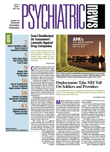Attempts to link suicide or suicidality to prescribing trends for antidepressants did not get much help from two observational studies in the February 14 British Medical Journal (BMJ).
One found that antidepressant prescriptions in Britain doubled between 1999 and 2003, but then fell to the 1999 level between 2004 and 2005, possibly because Britain's Medicines and Healthcare Products Regulatory Agency issued a warning in December 2003 that use of SSRIs in young people was“ unfavourable.”
Despite some short-term variability, the long-range trend from 1993 to 2005 indicated that suicide among 12- to 17-year-olds dropped annually by 3 percent to 4 percent.
“These large changes in prescribing did not seem to be associated with temporal trends in suicide or self-harm,” wrote Benedict Wheeler, Ph.D., a research fellow in the Department of Social Medicine at the university of Bristol, and four colleagues in the BMJ study.
A second paper from the same department noted that suicide rates in England and Wales for people aged 15 to 34 had declined since the 1990s and reached their lowest levels in 30 years in 2005. David Gunnell, M.B., Ph.D., a professor of epidemiology at Bristol, and colleagues speculated that the introduction of catalytic converters in cars also is responsible for the drop in the number of suicides since inhaled car exhaust in cars so equipped is less lethal.
Changes in risk factors for suicide—divorce, unemployment, and alcohol use—did not correlate significantly with changes in suicide rates. Neither did rates of antidepressant prescribing, they said.
None of this surprises at least one observer. The two British studies, showing a lack of connection between antidepressant prescribing rates and rates of suicide among young people, are more likely to be true than earlier studies linking use of antidepressants with reduced risk of suicide, wrote Greg Simon, M.D., M.P.H., senior investigator at the Group Health Center for Health Studies in Seattle, in an accompanying editorial.
“In truth, it would be surprising if antidepressants had any effect—positive or negative—on the risk of suicide in the general population,” said Simon. Only half of adults and one-fourth of adolescents diagnosed with major depression start on antidepressants, and many of them stop within weeks. “Sustained use of antidepressants is probably too rare to have much overall effect on risk of suicide in people living with depression.”
Regulatory warnings may have led to a reduction in antidepressant prescribing, but they haven't done much for the other half of the regulators' statement: closely monitoring patients as they start on the drugs.
“Only a fifth of patients [in the U.S.] starting [antidepressants] have even three follow-ups visits over three months,” Simon wrote.“ Furthermore, follow-up rates have shown no improvement over the past five years.”
Reporting on an overall drop in antidepressant prescriptions fails to distinguish just who is doing the prescribing, said one expert on suicide. Herbert Hendin, M.D., president and medical director of Suicide Prevention International in new york, said that much of the increase and drop-off in antidepressant prescriptions came from general physicians. Antidepressant use by psychiatrists for treating more seriously suicidal patients preceded their use by general physicians, Hendin believes.
In an interview with Psychiatric News, he ascribed the run-up in antidepressant prescribing to primary care physicians who were not treating the most depressed patients. “It became like an aspirin,” he said.
That feeling changed with the FDA warnings, beginning early in 2004. Primary care doctors no longer had the time or the expertise to closely follow patients starting on antidepressants, so they simply cut back on prescribing them.
“GPs might see patients once a month, but psychiatrists see their patients more frequently and can see side effects pretty soon if they crop up.”
Psychiatrists also know more about these drugs and how they work and probably haven't cut back on their use, he said. “I don't know of any psychiatrist who is not prescribing them when needed.”
Simon agreed that follow-up is the key to the proper use of SSRIs, even if it hasn't appeared in the statistics. “We can only hope that regulatory warnings will eventually have as much an effect on the quality of treatment as on the quantity,” he concluded.
